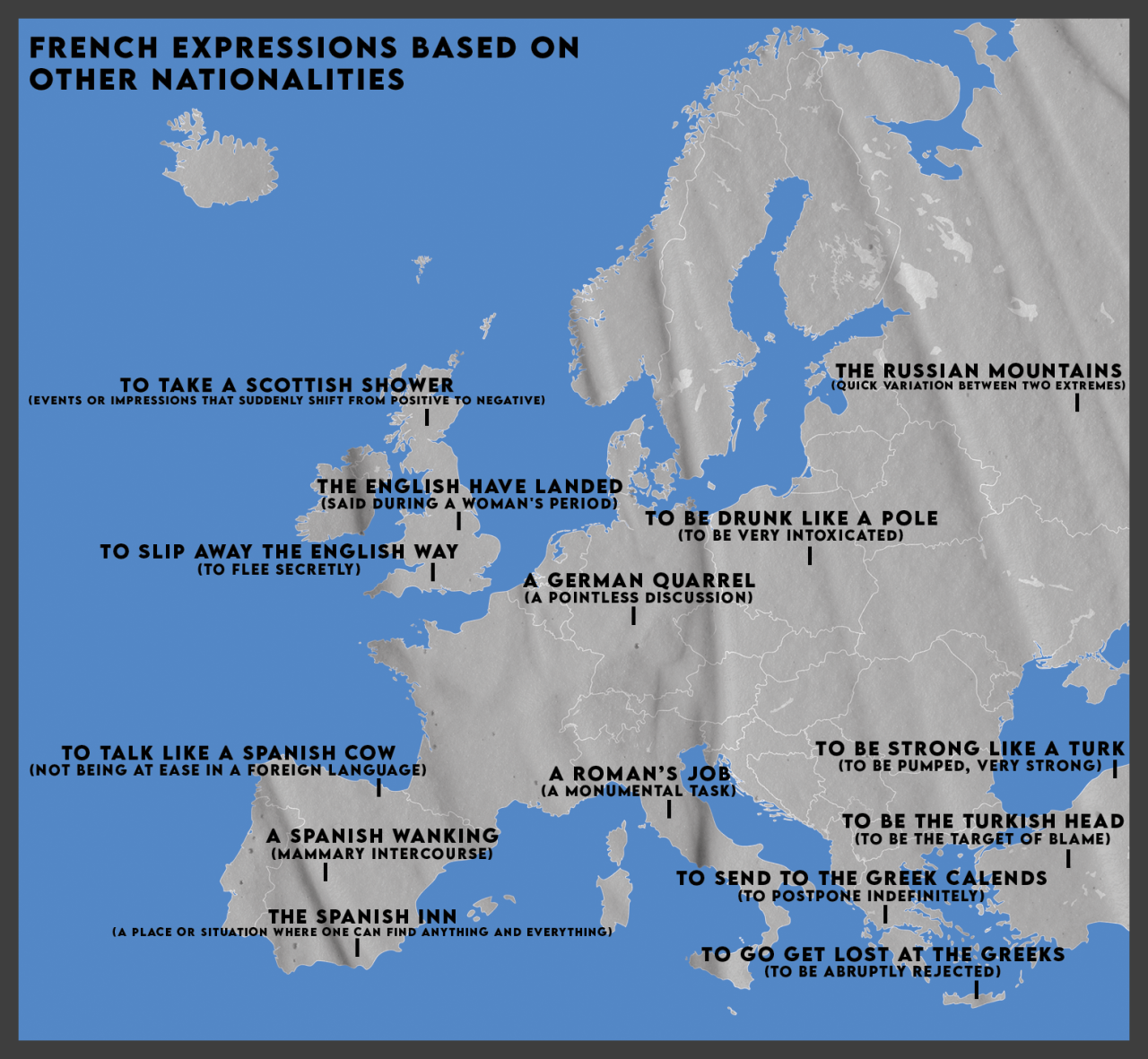
French Expressions based on Other Nationalities
These expressions come from various
online platforms, with a strict focus on those whose etymology can be
linked to specific nationalities. It is important to note that this map
is not intended to offend, but rather to explore the linguistic
interaction between cultures.I’ve
picked expressions that are tied to people or nationalities. For
instance, “To have the Portugueses sanded” (Avoir les portugaises
ensablées) refers to a type of oysters, not the people of Portugal.Here is the list of these expressions, along with their origins:
To take a Scottish shower (Prendre une douche écossaise):
This
French expression dates back to the 19th century and refers to a
hydrotherapy practiced at that time in Scotland. In a figurative sense,
it describes a situation where a combination of sensations, events, or
impressions swiftly transition from being positive to turning negative.The English have landed (Les anglais ont débarqué):
In comparison to the British armies which, during the Napoleonic wars, were dressed in red.To slip away the English way (Filer à l’anglaise):
Probably an alteration of the English “to take French leave”, dating from the 19th century.To talk like a Spanish cow (Parler comme une vache espagnole):
According
to the most plausible hypothesis, it would be a distortion of the
Occitan expression “parlar coma un gavach espanhòl” (to speak like a
Spanish gabatch). The word “gabatch” designates here the mountain
dweller from the Pyrenees.A Spanish wanking (Une branlette espagnole):
The origin of this 20th century expression is obscure and mysterious.A Spanish inn (Une auberge espagnole):
This
expression was used in the 17th century to describe the poor quality of
inns/hostels in Spain, which were widely used because they were on the
road to Santiago de Compostela.A German quarrel (Une querelle d’allemand):
The
most commonly accepted theory is that the Holy Roman Germanic Empire
was made up of numerous small states. These rulers frequently looked for
opportunities to engage in battles with neighboring states, aiming to
capture land and increase their power and influence.To be drunk like a Pole (Être saoul comme un polonais):
This
expression, which has become pejorative, was not so at its beginnings.
After a decisive battle, the Polish lancers of Kozietulski in Spain in
1808 were paraded before Napoleon as heroic survivors of this elite
unit. Jealous French generals, wanting to downplay the role of the
Poles, claimed that they were drunk. The Emperor responded to them,
“Well then, gentlemen, learn to be as drunk as the Poles!”.
Another version states that Napoleon, in admiration, said, “One had to be as drunk as a Pole to accomplish that.”The Russian mountains (les montagnes russes):
The
concept of Russian Mountains originated from toboggan races held on
snow-covered hills, especially in the vicinity of Saint Petersburg. In
the late 1700s, these races gained immense popularity, prompting
entrepreneurs to explore the idea in other countries. This led to the
development of rides using wheeled cars on tracks. In 1812, the company
“Les Montagnes Russes” constructed and operated such rides in the
Belleville district of Paris.
The term was subsequently used to describe roller coasters, and this analogy led to the emergence of the expression.A Roman’s job (Un travail de romain):
From
the reputation of the Romans for having accomplished Herculean works,
especially the construction of aqueducts and ancient roads.To be strong like a Turk (Être fort comme un turc):
This
expression comes from the 15th century and refers to the period of the
Ottoman Empire when the Turks achieved many conquests through their
sheer strength and ruthless behavior, showing no mercy. Thus, during
that time, the Turks represented the ultimate enemy, seen as unbeatable.To be the Turkish head (Être la tête de turc):
This
expression is based on the entertainment found at French fairs in the
late 19th century. These amusements involved gauging one’s strength by
hitting a head wearing a turban, evoking the stereotypical image of a
Turk.To send to the Greek calends (Renvoyer aux calends grecques):
From the Calends, which were not Greek but Roman, is an expression used by Suetonius in The Twelve Caesars to say “never”.To go get lost at the Greeks (Aller se faire voir chez les grecs):
This
expression indirectly refers to the alleged common homosexuality among
Greeks since ancient times, including practices like pederasty. Notably,
Plato’s work “The Symposium” illustrates this, featuring figures like
Socrates.
